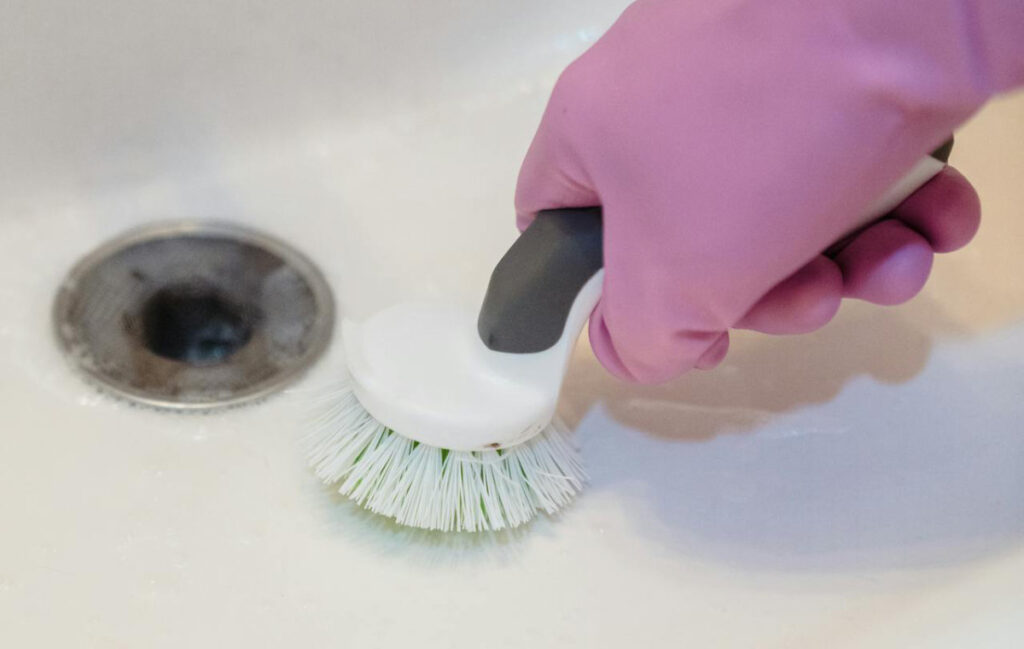Most of us have had that moment in the kitchen when the sink suddenly stops draining. You stare down at a pool of cloudy water, wondering what could possibly be stuck down there this time. Kitchen drains take on a lot, from cooking scraps to the remnants of dinner cleanup, and it does not take much for something to get lodged in a pipe.

Good kitchen drain etiquette can spare you from plenty of frustration. A little awareness goes a long way in keeping pipes clear and avoiding unexpected plumbing issues. If you have ever wondered which foods cause the most trouble, we have rounded up the biggest offenders and why they wreak so much havoc.
Grease, Oils, and Fats
Grease is one of the most common culprits behind kitchen sink trouble. It looks harmless when it is warm and liquid, which is why so many people pour it down the drain without thinking twice. The problem is that it cools rapidly inside the plumbing. Once it cools, it thickens and sticks to the pipe walls like glue. Over time, this layer catches other food particles, eventually creating stubborn blockages that even hot water cannot undo.
Whether it comes from frying bacon or sautéing vegetables, grease should never go down the drain. It builds up quietly, and because the process is slow, most people do not notice a problem until the drain is almost completely blocked. One day the water drains slightly slower, and by the next week, it barely drains at all. This is a typical pattern in clogged kitchen sinks.
A simple fix is to pour used grease into a heat-safe container and toss it once it solidifies. It keeps your pipes cleaner and saves you from dealing with an unnecessary plumbing incident.
Coffee Grounds
Coffee grounds are small, gritty, and deceivingly innocent. Many people rinse them straight into the sink because they look like they will wash away easily. Unfortunately, they do the exact opposite. Coffee grounds do not dissolve in water, and they tend to settle in the bends of your drain line, forming compact clumps that are extremely difficult to flush out later.
Even if your drain seems to handle them for a while, the grounds eventually join forces with grease or soap residue and form a dense obstruction. This is especially common in homes where people brew coffee daily. So if you are a coffee enthusiast, your drains probably feel the impact more than you think.
The safest move is to throw coffee grounds in the garbage or mix them into a compost bin if you have one. Your pipes will thank you, and your drain will remain much more cooperative.
Eggshells
A lot of people drop eggshells into the sink because they assume the garbage disposal will take care of them. While the disposal can grind shells into tiny pieces, those particles turn into a gritty paste that easily sticks to pipe walls. Eggshell membranes also tangle with other debris, making blockages worse.
Once the shell grit sticks to existing buildup, it creates a thick sludge that slows down your drain significantly. It might not cause a clog overnight, but over time, it becomes a real troublemaker. Eggshells are one of those kitchen waste items that seem safe but quietly contribute to major plumbing issues.
The good news is that eggshells are simple to deal with, and they break down wonderfully in compost. Tossing them into a bin or adding them to a compost pile spares your drain while helping your garden.
Starchy Foods
Starchy foods are sneaky because they seem soft and harmless. Rice, pasta, potatoes, and beans all expand when they absorb water. When these foods go down the drain, they keep absorbing water and continue to swell inside your pipes. As they expand, they stick together and become thick, sticky obstructions that block water flow.
Rice is especially notorious for slipping past drain strainers and settling in the P-trap. Potatoes and pasta create a glue-like sludge that is nearly impossible to flush out once it forms. Even a small amount can swell into a stubborn clog if it sits inside the pipe.
To avoid these problems, scrape starch-heavy leftovers into the trash instead of the sink. Your plumbing will stay far cleaner, and you will reduce the risk of unexpected slowdowns.
Fibrous Vegetables
Fibrous vegetables like celery, asparagus, artichokes, onion skins, and corn husks are tough on both garbage disposals and plumbing systems. Their long fibers wrap around disposal blades, making the motor work harder and reducing the disposal’s grinding power. Once they reach the drain line, the fibers tangle and trap other particles, forming rope-like clogs that do not clear easily.
Garbage disposals are not designed to handle stringy materials. Even if the disposal seems to chew them up, the fibers often slip through in long strands. Those strands eventually collect into dense knots further down the pipe.
The simple fix is to throw fibrous veggies directly into the trash or compost. It is a small habit that prevents major drain issues and helps keep kitchen plumbing healthy.
The Hidden Habits That Cause Kitchen Drain Trouble
Aside from the foods that clog drains, several everyday habits also play a role. Many homeowners do not realize that small choices eventually create big problems. A sink can handle a lot, but it is not invincible.
Here are some behaviors that make drain clogs more likely:
- Rinsing dishes with large scraps still on them
- Using the sink to wash away cooking oils
- Relying too heavily on the garbage disposal
- Ignoring slow drains until they become fully blocked
- Washing thick sauces or gravies down the drain
These small habits create buildup over time. When multiple factors stack together, the drain becomes more sensitive and more likely to clog. The good news is that breaking a few of these habits can greatly improve your kitchen plumbing’s performance.
Why Regular Kitchen Drain Maintenance Matters
Keeping your kitchen drain in good shape is not just about avoiding clogs. A well-maintained drain also reduces odors, improves hygiene, and protects your plumbing system from long-term damage. A kitchen sink sees more action than almost any other fixture in the home, so giving it some routine care makes a noticeable difference.
Simple maintenance steps help keep your drain flowing smoothly and limit the need for emergency plumbing calls. These include:
- Running hot water after using the sink
- Installing a high-quality drain strainer
- Cleaning the disposal with ice cubes and a small amount of citrus
- Using eco-friendly enzyme cleaners once a month
- Avoiding chemical drain cleaners that damage pipes
These habits make everyday kitchen tasks feel easier, and they reduce the odds of dealing with stubborn plumbing issues later. Seattle homes often have older pipes, so taking preventive steps becomes even more important.
What Your Garbage Disposal Can and Cannot Handle
Garbage disposals are incredibly handy, but they are often misunderstood. Many homeowners assume that a disposal can grind up almost anything, and that is where the trouble begins. Disposals are meant to handle small amounts of soft food scraps, not entire plates of leftovers or tough, fibrous foods.
A disposal can help break down food, but it cannot prevent clogs if the wrong materials go down the drain. Items like pasta, rice, and fibrous vegetables can still clog the pipes even after being ground up. The disposal only tackles the grinding part, not the drain-clearing part.
If your disposal is struggling or has stopped working altogether, we offer garbage disposal installation and repair services. Our team can get you back up and running quickly and help you choose the right disposal for your household’s needs.
What to Do When Preventive Habits Are Not Enough
Even if you avoid troublesome foods and take care of your disposal, kitchen drains can still clog for reasons outside your control. Older homes often have a buildup deep inside the pipes from years of use. Tree roots sometimes find their way into outdoor lines. And occasionally, a clog forms in a spot that no amount of hot water or home cleaning can reach.
That is when professional help becomes the best option. Plumbers use tools that go far beyond what homeowners have on hand. Drain snakes, hydrojetting equipment, and camera inspections help pinpoint the exact cause of the blockage and remove it safely.
Here are signs that you may need expert drain cleaning services soon:
- Water drains slower each week
- Odors creep up from the sink
- The garbage disposal backs up regularly
- You hear gurgling sounds when running water
- Multiple drains clog at the same time
If you notice more than one of these issues, the clog may be deeper than the kitchen pipes.
Dealing With Stubborn Kitchen Clogs? Gene Johnson Is Only One Call Away
When your kitchen sink refuses to cooperate, our team at Gene Johnson Heating, Cooling, Plumbing, and Electrical is here to help. We handle all types of drain clogs and kitchen plumbing problems throughout Seattle, Tacoma, Puyallup, and Mercer Island, bringing years of experience and friendly service to every home.
You can expect honest recommendations, careful workmanship, and fast response times. If your kitchen drain is giving you trouble, reach out to us anytime. We will get the clog cleared and your sink working like normal again so you can get back to enjoying your kitchen without the stress.





